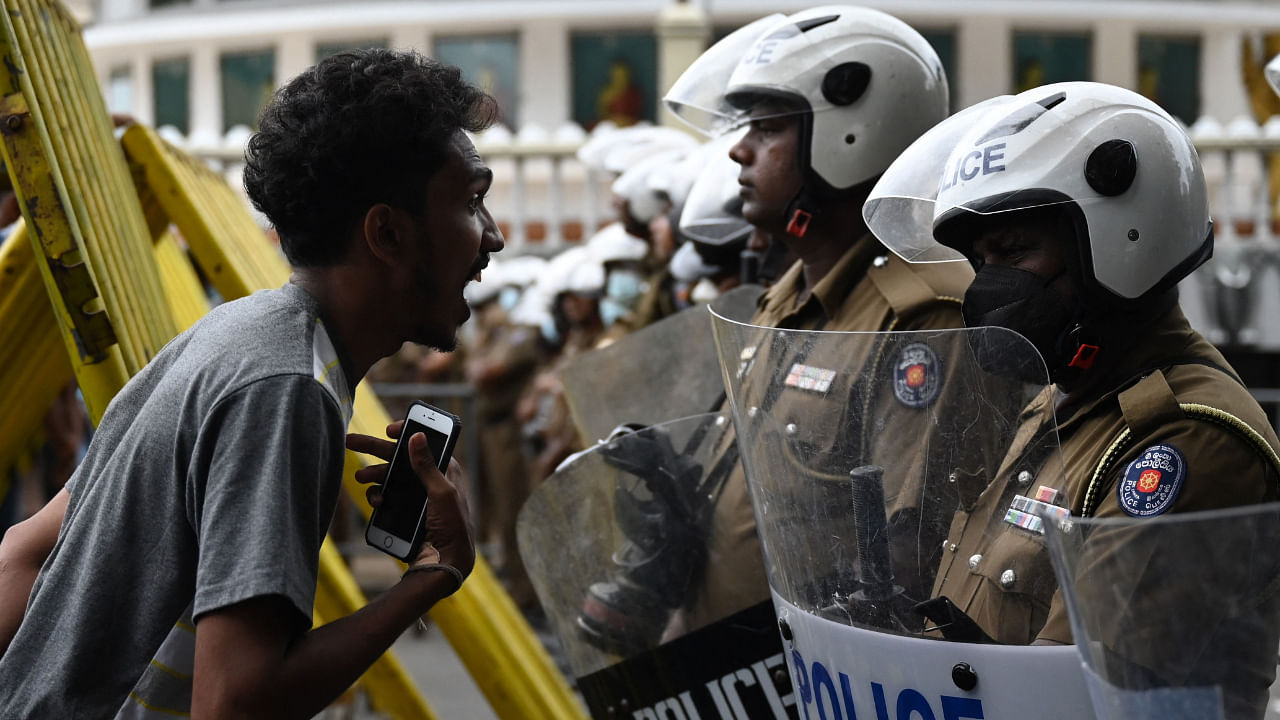
An international rights group has urged Sri Lankan President Ranil Wickremesinghe to cease the unlawful use of force against anti-government protesters and probe those responsible for abuses of human rights during the pre-dawn assault on them on Friday, a day after he assumed office.
According to a statement by the Human Rights Watch group, Sri Lankan security forces on Friday forcibly dispersed people at a peaceful protest site near the President's Secretariat and assaulted protesters that left more than 50 people injured.
At least nine persons were arrested in the incident at Galle Face protest site where several key government offices are located.
"Wickremesinghe, who took office on July 21, should immediately order the security forces to cease all unlawful use of force against protesters, release everyone arbitrarily detained, and investigate and appropriately prosecute those responsible for abuses," the statement said on Friday.
Also Read | Top UN official in Sri Lanka calls for inclusive consultations to resolve economic crisis
The rights watch group also urged foreign governments and multilateral agencies that are helping the debt-ridden country in the hour of crisis to emphasise to the new government about the respect for human rights which is critical for economic recovery of the bankrupt nation.
“Sri Lanka’s international partners should send the message loud and clear that they can’t support an administration that tramples on the rights of its people,” the statement noted.
“Just one day after taking office, Wickremesinghe oversaw a brutal assault by security forces on peaceful protesters in the heart of Colombo,” said Meenakshi Ganguly, South Asia director at Human Rights Watch.
“This action sends a dangerous message to the Sri Lankan people that the new government intends to act through brute force rather than the rule of law,” she said, stressing upon the use of force by several hundred police, army, navy, and air force personnel in the Friday morning raid.
The statement added that the security forces, using batons, attacked demonstrators who had remained at the protest site, along with several journalists and two lawyers, hours after they announced that they would leave the protest site later in the day.
Nine people who were arrested were produced in court on July 22 and released on bail.
According to a statement by the Sri Lanka Bar Association the arrested persons included “at least one lawyer and several journalists. . . The use of the Armed Forces to suppress civilian protesters on the very first day in office of the new President is despicable and will have serious consequences on our country’s social, economic, and political stability,” the influential body said.
The bankrupt country, which has been witnessing its worst economic crisis since Independence in 1948, has defaulted on its foreign loans.
The United Nations warned that 5.7 million people "require immediate humanitarian assistance," with Sri Lankans experiencing extreme shortages of essentials including food, fuel and medicines.
Protesters in March began demonstrating against the Rajapaksa family and demanded the resignation of the entire Rajapaksa family, leading to the resignation of then-Prime Minister Mahinda Rajapaksa on May 9, and his brother, President Gotabaya Rajapaksa, who fled the country on July 13 and resigned the following day.
Wickremasinghe, who became the acting president after Gotabaya's escape from Sri Lanka, was on July 20 elected as the new president by the country's parliament.
He had previously described some protesters as “fascists” and declared a state of emergency on July 18.
The new president late on Thursday in an order called out "with effect from July 22, all the members of the Armed Forces . . . for the maintenance of public order”.
The Human Rights Commission of Sri Lanka said the state of emergency was “inappropriate” and called for it to be withdrawn.
It called the military attack on peaceful protesters “brutal and despicable”.
Diplomats from several countries, including the United States, Britain, Switzerland and Canada, as well as the UN and European Union, have also condemned the assault on the protest site.